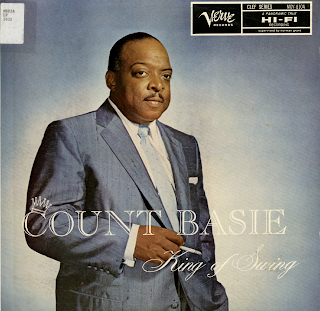1958
Woody Herman
First Herd At Carnegie Hall
VSP Verve VSPS-1
1966
Woody Herman - Clarinet
Sonny Berman, Pete Candoli, Conrad Gozzo,
Irv Markowitz, Shorty Rogers - Trumpets
Ed Kiefer, Ralph Pfeffner - Trombones
John LaPorta, Sam Marowitz, Mickey Folus,
Flip Phillips, Sam RubinWich - Saxophones
Tony Aless - Piano
Chubby Jackson - Bass
Red Novo - Vibes
Billy Bauer - Guitar
Don Lamond - Drums
From the back cover (Lion L70059): It was on a chill Monday evening in March, 1946 that Woody Herman and his "Herd" filled onto a stage at staid Carnegie Hall in New York City to "blow up a storm" and make a bit of jazz history. Their forces number no less than fourteen saxes, trumpets and trombones – plus four rhythm instruments. Woody himself doubled between clarinet and alto sax and, of course, held forth on vocals. The group that night was truly of all-star caliber: Sam Marowitz and John PaPorta, alto saxes; Joe "Flip" Phillips and Mickey Folus, tenor saxes; Sam Runbinwitch, baritone sax; Conrad Gozzo, Pete Candoli, Irving Markowitz, Shorty Rogers, and Sonny Herman, trumpets; Ralph Pfiffner, Ed Kiefer, and Bill Harris, trombone; Tony Aless, piano; Billy Bauer, guitar; Don Lamond, drums; Chubby Jackson, bass; Red Norvo, vibraharp; and Woody himself. This was just about the greatest "Herd" Herman ever assembled. The date was March 25m 1946 – and for the jazz-lover lucky enough to be in attendance it was a memorable one.
On the music stands that night lay some of the most fabulous arrangements ever penned in the field of big band jazz. Most of them were the work of a phenomenally talented twenty-three-year-old who was to pass on from trump to trump in later years: Ralph Burns. Burns was matched in his originality and daring that night, however, by another remarkable arranging talent, Neal Hefts, was was responsible for the scoring of three top Herman favorites: Wildroot, Everywhere and The Good Earth. And, those Burns and Hefit arrangements were probably played that night with more skill and fire than they ever had or have been since. The late Sonny Berman took most of the trumpet solos, with Pete Candoli soaring forth on Superman With A Horn.
Woody gave with some fine clarinet passages, "Flip" Phillips held forth on the solo tenor, and Bill Harris shone on spotlighted trombone. Between the big band bits, there was some flashy display form that smaller aggregation: "The Woodchoppers" – and here gleamed the vibes of Red Norvo.
From the back cover (VPS Verve VSPS-1): All tenor sax solos by Flip Phillips. All trombone solos are by Bill Harris. All trumpet solos are by Sonny Berman except the closing trumpet work on Your Father's Mustache, which is by Pete Candoli.
Arrangements are by Ralph Burns, except Your Father's Mustache, which was a "head" arrangement with some brass ensembles scored by Neal Hefti; Blowin' Up A Storm, which had sections arranged by Hefti; and Everywhere, on which Ralph Burns and Hefti collaborated.
This album was recorded live in Carnegie Hall on March 25, 1946, at the now-historic concert given by The First Herd. A companion volume, The Woodchoppers & The First Herd at Carnegie Hall (VSP/VSPS-19) is also available.
Red Top
Superman With A Horn
Bijou
Wild Root
Four Men On A Horse
The Good Earth
Panacea
Blowin' Up A Storm
Everywhere
Heads Up
Your Father's Mustache



















